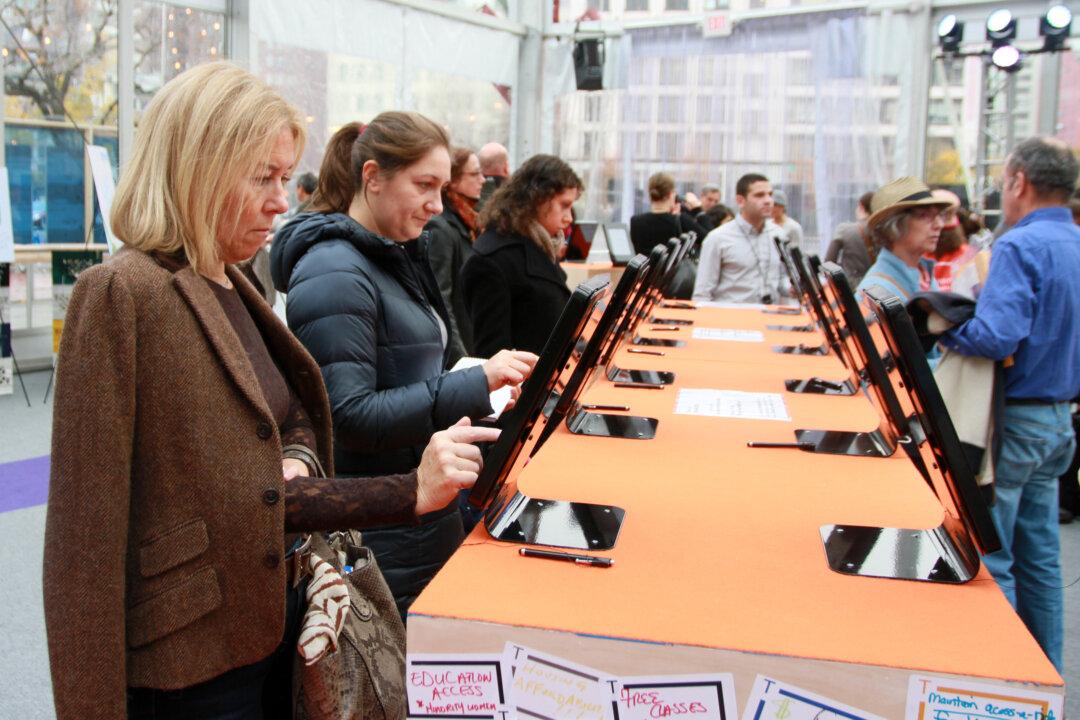NEW YORK—A spacious heated tent with transparent walls has been set up as a center for New Yorkers to tell Mayor-elect Bill de Blasio about their priorities, their problems, and their hopes.
The structure and the citywide effort are backed by a group of ten foundations, including the Ford Foundation, Rockefeller Brothers Fund, and The New York Community Trust. The goal of the effort is to let New Yorkers tell de Blasio’s transition team about their priorities during a process, between Election Day and Inauguration Day, that is typically closed to the public.
The Talking Transition effort—not affiliated with de Blasio—includes 100 canvassers who speak 19 languages and gather surveys throughout the city. It has a website and stations in senior centers and libraries. The transition tent is at the center of the effort. It was erected rapidly on Canal Street and Varick Street and opened to the public on the weekend after the election.
Forums are scheduled daily at the tent leading up to a Town Hall Nov. 23 with expected attendance of 500. On Sunday, some 200 attended “A Food Primer for Our New Mayor.”
Two co-chairs of de Blasio transition team, Carl Weisbrod and Jennifer Jones Austin, toured the tent Nov. 17. Neither would comment on upcoming appointments or the details of the transition. Jones Austin said the team’s goal is to assemble a competent, progressive, and diverse administration. Both praised the Talking Transition effort.
“It’s a great step forward in civic engagement,” Weisbrod said. “And it’s a model for not only New York, but really a model for the nation and for the world, ultimately, to engage citizens in this era of modern communications.”
Dozens of touch-tablets are set up in the tent offering a five question survey on public school quality, job availability, the price of housing, relations between community and police, and health care. No data is yet available from the surveys. Organizers said they are on track to collect 50,000 surveys.
The data from the surveys will be made public in the coming week. Organizers plan a competition of creating info graphics based on that data, scheduled for Nov. 20. Danny Fuchs, the director of the transition tent, said that the forthcoming results “will inform policy making over the next four years.” The data and info graphics will be sent to de Blasio’s transition team.
“I’m excited about what we’re going to receive,” Jones Austin said. “It will help shape and inform the mayor’s agenda. It will deepen a lot of his vision and his thinking.”
Ava Berman, 26, wrote down her priorities on one of the stickers stocked in wooden cases at the tent. She asked that the labeling of genetically modified organisms on food packaging be made mandatory. On a second card, she expressed her opposition to fracking—a contentious drilling technique used to extract natural gas.
“There are more and more studies coming out about the dangers of fracking,” Berman said. “We should invest in renewable energy sources.”
Thousand of cards like Berman’s are plastered on boards throughout the tent. Among them, are demands to stop police frisking, increase the minimum wage, drop the Common Core standards adopted by state schools, reduce public transportation fares, open up City Council, and expand school lunch options.
Some messages are serious, some angry, some funny, and some subversive—a cacophony easily expected in New York City. One card demands for “fast trains to airports.” Another asks for “more cronuts.”
“The goal is really engagement,” said Christopher Stone, president of the Open Society Foundations, one of the funding organizations for Talking Transition. “To capture the energy that came from the election and keep that going, not just let it end on Election Day, and have the whole government, the whole debate, move inside behind closed doors.”
Carla Rice, a social worker at the New Life School, a high school for special education students, wrote that she wants new high-tech cafes to open throughout the city, offering teens a safe environment.
Rice, who lives in the Bronx, said that her son and many of the students at her school don’t have a place to go and spend time with other teens. Many, she added, feel left out. To her, the tent “is a great beginning.”
“Now,” Rice said. “The challenge is to take this information and do something with it.”





